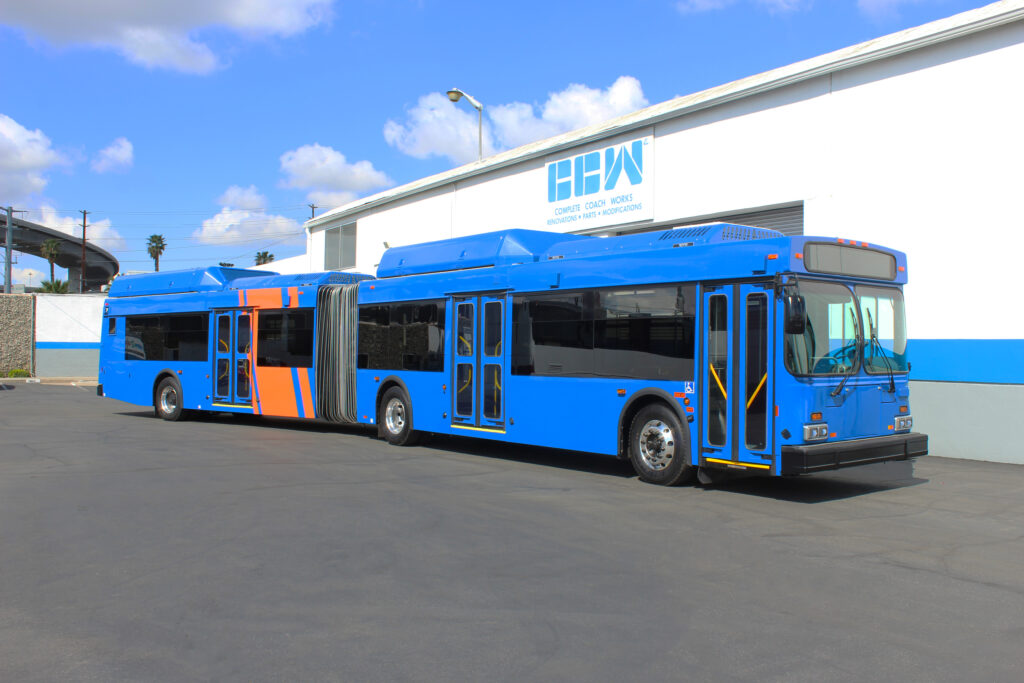The Nation’s First 60-Foot Bus Rehabilitation to Battery Electric
Complete Coach Works installs proprietary battery-electric technology in an articulated bus for TriMet
Complete Coach Works (CCW) breaks new ground in zero-emissions mass transit with the Nation’s first conversion of a 60-foot articulated diesel-powered bus to battery electric for TriMet.
CCW, the leading North American bus remanufacturer, combined the Voith Electrical Drive System (VEDS) with CCW’s own Zero Emission Propulsion System (ZEPS) battery technology to solve the electric conversion challenge in a 60-foot articulated workhorse transit bus.
Since 2012, CCW has converted more than 70, 30-foot, 35-foot, and 40-foot fossil fueled transit buses to battery electric. The company offers 403 kWh and 504 kWh lithium ion NMC battery packs.
CCW is thrilled to now offer customers a 605 kWh lithium ion NMC battery and powertrain solution to support larger and heavier vehicles that will easily haul their significantly higher passenger loads.
60-Foot Breakthrough
CCW converted the Nation’s first-ever 2007 60-foot New Flyer diesel-powered articulated transit bus to battery electric. The project included a complete restoration of TriMet’s bus, known as Desert Rose, to like-new condition with the ZEPS 605 kWh lithium ion NMC battery pack and the VEDS powertrain.
“We’ve worked with TriMet in the past converting three 40-foot low floor transit buses to battery-electric, but this was the first time facing a 60-foot articulated bus, which requires more energy storage than any previous conversion,” said Jim Paul, CCW’s Regional Sales Manager. “We’ve proven ourselves again in this accomplishment and thank our partners on the project. The advanced CCW batteries combined with VEDS provides the bus with a significantly longer operating range while maintaining its battery life.”
Keeping high-use, low-floor buses rolling and looking like new
Articulated buses not only carry more passengers, but generally provide a lower-floor design that offers greater passenger accessibility. TriMet’s 14-year-old refurbished bus not only features new passenger lightweight seating, flooring, fresh branding and LED exterior and interior lighting, it also provides a new ADA-compliant wheelchair ramp for faster passenger onboarding.
“Our process significantly extends the bus’s service life while providing a much quieter and zero-emission ride for Portland commuters,” said Jim. “The teamwork between CCW, TriMet and Voith not only moves TriMet’s bar higher on achieving its green initiatives, but paves the way for more agencies to adopt rehabbed electric buses as part of their fleets.”
TriMet is the 16th largest public transit agency in the United States and ninth in the nation in ridership per capita. In 2019, it committed to a clean energy fleet by the year 2040 and became the first U.S. transit agency to acquire battery-electric buses with charging stations completely powered by wind energy.
TriMet has begun extensive testing and evaluation of this inaugural 60-foot model on a Portland metro express route where the bus is already proving its reliability according to TriMet.
“TriMet is proud to partner with CCW in our quest to be the leading Transit Agency that leads the renewable energy drive, and Desert Rose has been a shining star — a Giant of a Rose. The performance numbers from this 60-foot articulated bus are unbelievable and we look forward to a continued partnership with CCW,” said Samuel Rumhizha, Director Bus Maintenance.
CCW’s ZEPS battery division, operated with sister company Transit Sales International, has developed the remanufactured all-electric bus by taking existing low-floor transit buses and remanufacturing them into like-new vehicles with their own proprietary all-electric drivetrain systems. Currently, ZEPS buses have logged four million passenger miles across the nation.
Category: Cab, Trailer & Body, Electric Vehicles, Engines & Drivetrains, Equipment, Featured, Fuel & Oil, General Update, Green, News, Products, Tech Talk, Transit News











